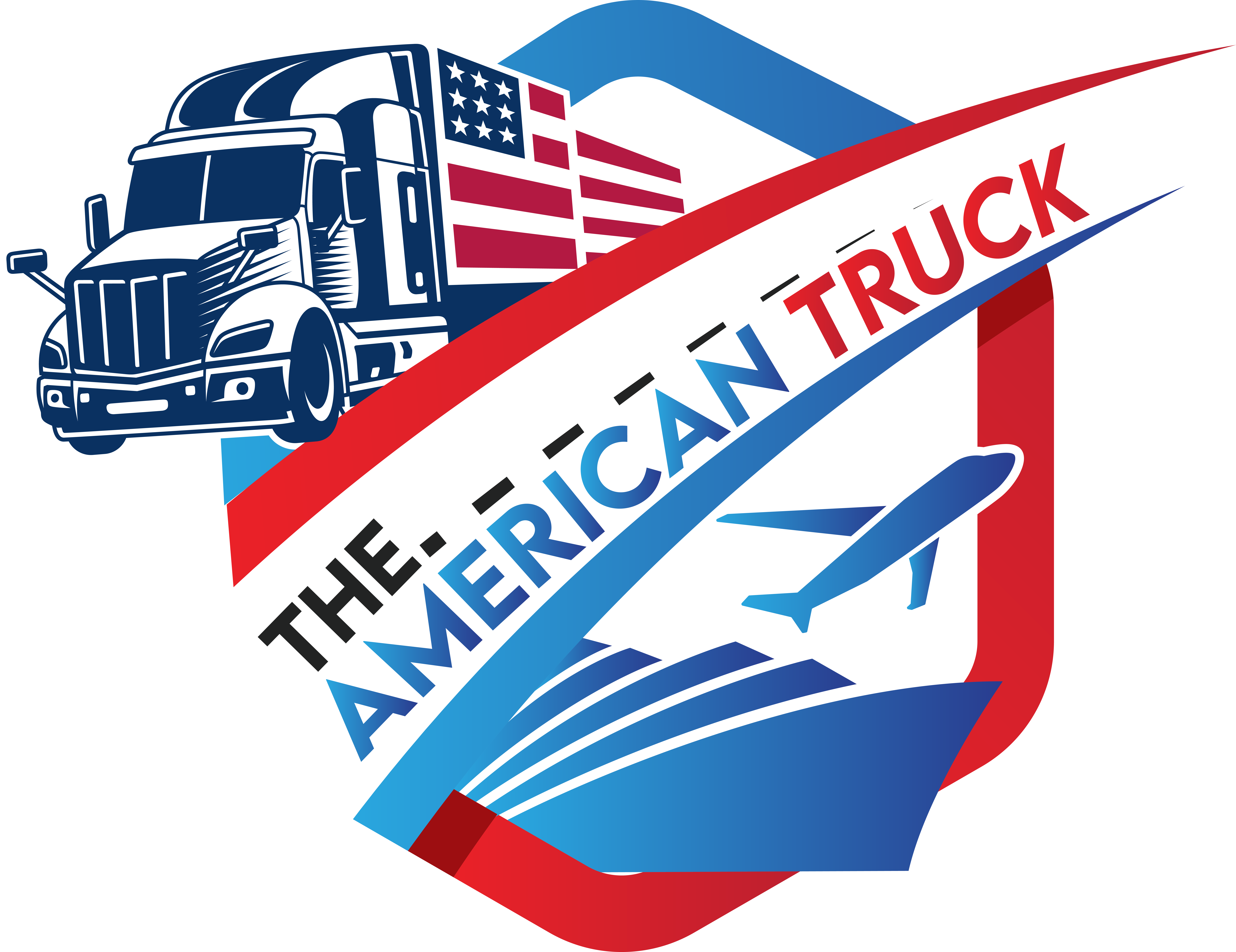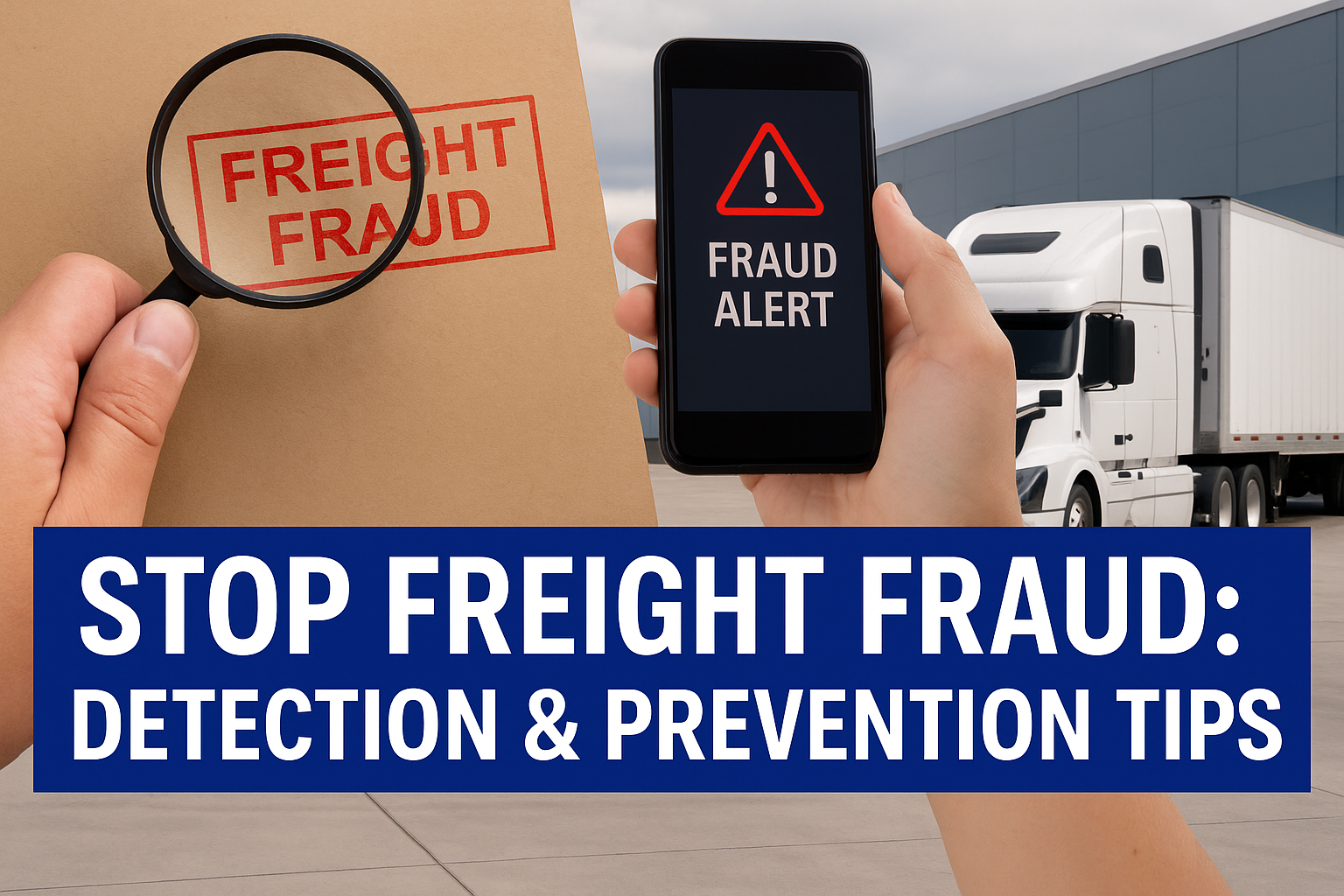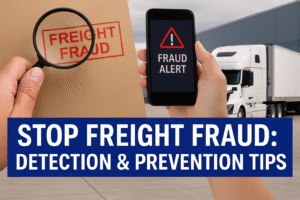Where’s my freight?
That’s the million-dollar question (sometimes literally) logistics managers ask when freight fraud strikes.
Freight fraud is no longer a rare horror story whispered in truck stop diners. It’s a rapidly growing problem—costing the U.S. logistics industry billions each year. Whether it’s fake carriers, double brokering scams, or outright cargo theft, fraudsters are leveling up faster than most 3PLs can react.
Just last year, over $800 million was lost to cargo theft and freight scams, and that number’s rising faster than fuel prices on a holiday weekend.
And here’s the kicker: Most companies don’t realize they’ve been hit until it’s too late.
But you? You’re smarter than that—or at least you will be by the end of this post.
At The American Truck Inc., we help U.S. businesses tackle supply chain headaches with real-time tracking, reliable carriers, and top-tier freight solutions. That includes helping you sniff out the fraudsters before they strike.
Let’s break down how freight fraud happens, the red flags to look out for, and—most importantly—how to stop it dead in its tracks.
What Exactly Is Freight Fraud?
Freight fraud is a catch-all term for deceptive or criminal practices targeting logistics operations. These include:
Double brokering (when a broker illegally re-brokers a load without the shipper’s knowledge)
Cargo theft
Fake carrier setups
Invoice scams
False identity impersonations
Sometimes it’s a rogue broker in their mom’s basement pretending to be a carrier. Other times it’s a sophisticated ring that makes Ocean’s Eleven look like amateur hour.
Whatever the form, the result is the same: lost money, lost freight, and a whole lotta stress.
Red Flags: How to Spot Freight Fraud Before It Bites
Ever heard the saying, “If it smells fishy, it probably is”? In freight, fraud stinks—and there are plenty of warning signs.
Too Good to Be True Rates
If a rate makes you do a double take because it’s way below market, pause. Fraudsters bait companies with rock-bottom quotes to snatch the load and disappear.
Pro Tip: Compare spot market rates across multiple sources before accepting any suspiciously low offers.
Incomplete or Fake Paperwork
Bogus insurance certificates, mismatched DOT numbers, and recently registered MCs should all raise your fraud alerts.
Real-life fail: A New York-based shipper lost $35,000 of electronics because they hired a “carrier” whose MC number belonged to a defunct dry cleaner.
Urgency & Pressure
Fraudsters love to rush decisions. “Book now or lose the truck!” They’re hoping you skip vetting steps in the name of urgency.
Sketchy Communication
If the carrier only texts, uses Gmail, or refuses to hop on a quick call? Run like your shipment depends on it. Because it does.
Tools and Tactics for Real Freight Fraud Detection
Here’s the good news: You don’t need to be Sherlock Holmes to detect fraud. With the right tools and habits, even small teams can catch cons before they cash in.
Use a Carrier Screening Process
This should be your first line of defense. A proper carrier screening process helps weed out bad actors long before they’re anywhere near your freight.
Checklist:
Verify MC/DOT numbers on FMCSA
Review insurance certificates
Check how long the company’s been active
Call listed references (yes, actually call them)
Look for matching emails, phone numbers, and physical addresses on all docs
At The American Truck Inc., we’ve built a carrier network that passes rigorous screening standards, ensuring you’re never blindsided by a scam.
Enable Automated Fraud Alerts
Tech is your friend here. Use TMS platforms or 3PL software that send fraud alerts when:
A carrier has abnormal activity
They’re tied to multiple incidents
Their MC is too new or recently reinstated
Think of it like antivirus software for your supply chain.
Monitor Load Boards Like a Hawk
Double brokering often originates on load boards. A fraudster sees your posted load, impersonates your carrier, and poof—your cargo’s gone.
Limit exposure by:
Using private load boards
Vetting both ends of the transaction
Not publicly listing sensitive freight (especially high-value stuff like electronics)
Double Brokering: The Sneakiest Scam in the Game
Double brokering deserves its own section—because it’s one of the most common and costly freight fraud tactics out there.
Here’s how it works:
You post a load.
A fraudster posing as a legit carrier accepts it.
They re-broker it to a real carrier—without telling you.
That real carrier hauls the freight (often unpaid).
The scammer pockets the payment—and disappears.
Now you owe the real carrier, but your freight’s already delivered… and there’s no trace of the imposter.
According to CargoNet, double brokering rose 400% in 2023 alone. It’s a logistics pandemic.
Prevention Tips:
Work only with carriers you know—or who are thoroughly screened.
Check for MC overlaps and recent authority changes.
Use tools like Carrier411 or RMIS to trace relationships.
The Rise of Cargo Theft (And How to Lock It Down)
Here’s a sobering stat: One shipment is stolen every 45 minutes in the U.S.
Cargo theft isn’t just happening at sketchy truck stops. It’s moved online—with fake pickups and GPS spoofing being the new weapons of choice.
Hot tip: High-value goods like food, pharmaceuticals, and electronics are top targets. Thieves love what they can’t trace.
Ways to Fight Back:
Require photo IDs from drivers before loading
Use GPS tracking (and geofencing)
Don’t post high-value loads publicly
Use security-sealed trailers
And for the love of freight, don’t ignore that gut feeling. If a pickup doesn’t feel right, put the brakes on.
At The American Truck Inc., we offer real-time tracking and work only with trusted, vetted carriers to help protect your freight from the ever-evolving threat of theft.
Case in Point: The $60K “Ghost Carrier”
Let’s talk about Joe from Chicago. Joe runs a mid-sized food distributor. One Tuesday, he booked what looked like a decent reefer carrier off a load board for a load of specialty cheese worth $60,000.
They exchanged emails, signed a rate con, and everything looked legit—until the truck never arrived.
Turns out, the “carrier” had copied the identity of a real company, spoofed the email, and intercepted the BOL. By the time Joe realized something was wrong, the cheese (and the thief) had melted away.
If Joe had used a vetted provider like The American Truck Inc., he would’ve saved himself a whole lot of cheddar. Literally.
How to Bulletproof Your Freight from Fraud
Let’s recap with some quick-hitter best practices:
Use trusted, screened carriers only
Check MC authority, insurance, and references
Invest in fraud detection tools and TMS integrations
Monitor and limit exposure on public load boards
Never skip a carrier vetting call—even if it’s “just one load”
Use partners like The American Truck Inc. who make fraud prevention part of the service
Final Word: Don’t Let Fraud Steer Your Freight Off Course
The freight industry is tough enough without digital bandits lurking in the shadows. But with the right strategy, partners, and tech in place, you can outsmart the scammers and keep your cargo moving safely.
Whether you’re shipping cheese, car parts, or coffee beans, fraud prevention isn’t optional anymore—it’s survival.
At The American Truck Inc., we believe in proactive freight solutions. From vetted carriers to real-time tracking, we help you ship smarter, safer, and fraud-free.
Contact Info
Let’s secure your supply chain together.
📞 Call: (630)-884‑1125
🌐 Website: https://theamericantruck.com
📧 Email: info@theamericantruck.com


